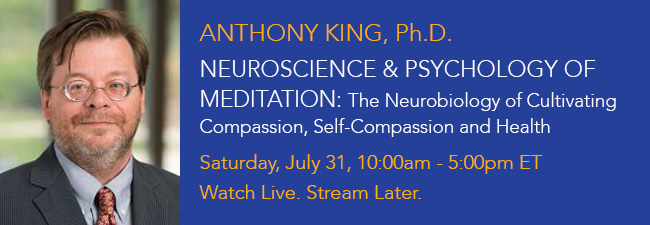
Compassion, empathy, and love are universally considered among the most positive of human emotions across spiritual traditions and ethical, humanistic, and psychological thought. Biologically and evolutionarily, affiliative emotions such as love and compassion are powerful motivators that are conserved in particular among social mammals, and seen as the foundation of family and social functioning.
Some spiritual traditions, such as Buddhism, have ancient meditations and cognitive-emotional contemplative practices to induce, stabilize, and cultivate states of love and compassion, including the famous practices of metta (loving-kindness), karuna (compassion), tong-len (“sending and receiving”), developing bodhicitta, etc. These practices often start with a personal reference / object (i.e. “ordinary” love) and move to a more universal reference, and also practice generating love and compassion for oneself.
Recent research with these contemplative practices (and adaptations into psychological interventions) have found positive effects on mood, pro-social attitudes and behaviors, psychological “burn-out” in caregivers like nurses and doctors, and even chronic lower back pain, suggesting they can improve the quality of our lives and relationships. Research has also found changes in brain activity and connectivity in brain networks, for example, within the reward neurocircuitry and mirror-neuron networks.
This day-long experiential workshop will provide instruction and guided practice in several forms of contemplative practices including basic mindfulness, loving-kindness (metta), self-compassion, tonglen, etc. It will also provide a comprehensive and up-to-date explanation of the psychology, evolutionary biopsychology, and neuroscience of love and compassion from neurobiology research in animals and humans.
We will discuss cutting-edge human neuroimaging work about effects of forms of love and compassion meditations on social cognition, perspective taking, and mentalizing; as well as specific effects on neural networks, the autonomic nervous system, and psychoneuroimmunology, providing positive outcomes in prosocial behaviors, quality of life and relationships, and how these have been successfully incorporated into treatments for depression, anxiety, stress, addiction, and chronic pain.
Anthony King is an Associate Professor in the Department of Psychiatry and Behavioral Health and the Institute for Behavioral Medicine Research (IBMR) at The Ohio State University, and Director of the OSU Center of Excellence for Resilience. He is also an adjunct faculty of The University of Michigan Medical School and Institute for Social Research. He is a licensed clinical psychologist, and certified teacher of Mindfulness-based Cognitive Therapy (MBCT), and led the MBCT program for Anxiety and Depression at UM for several years. He currently directs the OSU Laboratory for Mindfulness and Compassion in Psychotherapy at IBMR, and conducts NIH-funded clinical neuroscience research on Mindfulness and Compassion-based psychotherapy for PTSD, anxiety, and depression, and their effects on neural networks using functional MRI neuroimaging.
Tony has been a student of Kyabje Gelek Rimpoche Dorjechang for over 30 years, and an instructor of Jewel Heart Tibetan Buddhist Centers since the mid-1990s.
DATE/TIME:
Saturday, July 31, 2021
10:00 am – 1:00 pm and 2:00 – 5:00 pm Eastern
REGISTRATION
COST: $80 Members / $100 Non-Members
No one is turned away due to financial considerations.
Registration includes on-demand access to this program’s recordings as well as support materials via a personal Jewel Heart login account. Newcomers to Jewel Heart online programs receive instructions about their account in their registration confirmation email.
VIDEO
Other Courses for Purchase by Anthony King, PhD:



